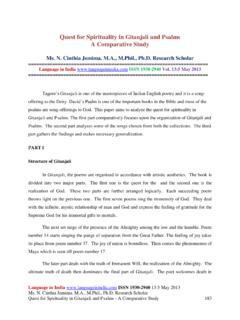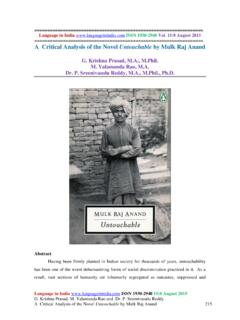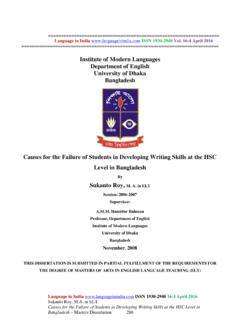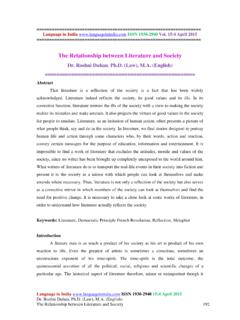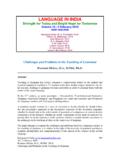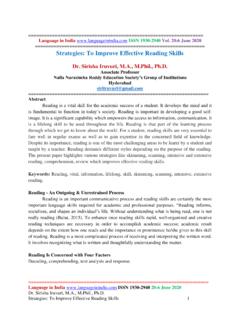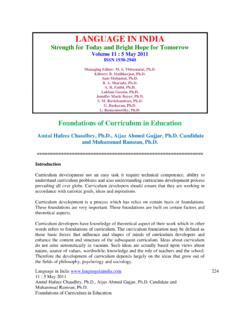Transcription of Indian Philosophical Aspects and the Theme of Devotion in ...
1 LANGUAGE IN INDIA Strength for Today and Bright Hope for Tomorrow Volume 8 : 8 August 2008 ISSN 1930-2940 Managing Editor: M. S. Thirumalai, Editors: B. Mallikarjun, Sam Mohanlal, B. A. Sharada, A. R. Fatihi, Lakhan Gusain, K. Karunakaran, Jennifer Marie Bayer, Indian Philosophical Aspects and the Theme of Devotion in Rabindranath Tagore s gitanjali P. Deepa, Candidate Language in India 8 : 8 Aug 2008 Philosophical Aspects of gitanjali P. Deepa 1 Indian Philosophical Aspects and the Theme of Devotion in Rabindranath Tagore s gitanjali P. Deepa, Candidate Indian philosophy includes the ancient wisdom of the Upanishads, the Bhagavad Gita, Vedas and ideas from Buddhism and Jainism, among others.
2 Rabindranath Tagore s gitanjali embodies most of these Aspects of Indian philosophy. The major Theme in gitanjali is Devotion to God. This paper focuses on the Indian Philosophical Aspects and the Theme of Devotion in Rabindranath Tagore s gitanjali . gitanjali focuses on the all-pervading presence of God everywhere. gitanjali brings its readers into direct contact with the Infinite. gitanjali proclaims that God is neither an abstraction, nor an incarnation, but an ever-present force and an all-pervasive influence. He is to be seen in the various forms of nature including humans. The Lover and the Beloved: Devotional Poetry According to S. Radhakrishnan (1999), the poems of gitanjali are the offerings of the finite to the Infinite.
3 The relationship between the two is conceived as that of love between the lover and the beloved. The mystics all over the world use this analogy and it is constantly used to express the true relationship between the human soul and God. The central Theme of gitanjali is devotional. It is in the great tradition of devotional poetry centering on the love of Radha and Krishna. The human soul is spoken of as Radha or the beloved waiting for the arrival of the lover or the bridegroom, Krishna. It is a drama of love, which takes place between Radha and Krishna. Radha, who surrenders everything to Krishna, symbolizes the human soul and the terrestrial Universe yearning with reckless passion for union with God. Samsara, Human Birth and the Status of Humans According to several strands of Indian philosophy, to take on the human form of life is a rare privilege for souls.
4 Souls get human body only after evolving through an infinite number of births as lower species. It is claimed that, only in human form, the living entity has the intelligence to understand divine laws and thus the soul could hope to free itself from the cyclical bondage of births, deaths and re-births. It is asserted that the soul has the ability to reach God, only after being born in a human body. Thou hast made me endless, such is thy pleasure. This frail vessel thou emptiest again and again, and fillest it ever with fresh life. (G1) In song 1, Tagore talks about the immortality of the soul. Human soul is eternal and immortal and it is the will of God that it should be so. Human body is like a weak vessel, which can be easily broken. God fills this body again and again and human life is Language in India 8 : 8 Aug 2008 Philosophical Aspects of gitanjali P.
5 Deepa 2constantly renewed. Man dies and is born in another form. This implies the theory of incarnation of soul after death. gitanjali and Gita The lines from gitanjali can be compared with Bhagavad Gita. As a person puts on new garments, giving up old ones The soul similarly accepts new material bodies giving up the old and useless one. (BG. 2:22. Verses are cited from Prabhupada 1987.) Self-realization is the highest wisdom, which can be achieved through a varied experience over the ages. The soul must travel far and wide and take many births and gain much and varied experience before it can realize the truth that God is immanent and is present everywhere. The Truth of Divine Immanence In his book Indian Philosophy, S.
6 Radhakrishnan (1927) observes: The ultimate truths are truths of spirit, and in the light of them actual life has to be refined ( Indian Philosophy ) Tagore says that through wide experience and spiritual discipline the truth of divine immanence can be realized. Through God s grace, man realizes his self and finds that God is within him and not outside. My eyes strayed for and wide before I shut them and said Here art thou! (G. XII) Where Is God? Get the Answer After Long and Varied Experience Tagore says that man cries out of his ignorance and asks Oh, where is God? It is only through wisdom gained after long and varied experience that his question is answered. Then he is assured of the fact that God is within him and that God is in every object of nature.
7 Man gets real happiness only when he realizes the presence of God within himself and others. Tagore believes that all the desires that perplex and bewilder men are entirely false and meaningless, as they cannot satisfy and give happiness and peace to him. S. Radhakrishnan (1999) acknowledges this: Only the infinite can satisfy the soul. (p. 108) The Role of Attachment An important element of traditional Indian philosophy is that all the trouble in the world is caused by attachment. Tagore says that attachment to persons can be turned into pure love if we train the mind to look upon those persons as different forms of God. God is in Language in India 8 : 8 Aug 2008 Philosophical Aspects of gitanjali P.
8 Deepa 3every one and so a devotee should do his duty to his relatives, but his love for them should be transformed into pure love based on seeking God in all of them. If a devotee does like that, then there will be no attachment even if he moves closely with his relatives and remember them often. S. Radhakrishnan in The Philosophy of Rabindranath Tagore says: If their love has its absolute center in creatures, whether brute or human, there will be misery, and they will suffer from disappointments through sickness, death and separation. But if they have the consciousness of the infinite personality in the center and background of their personal life, then the power of love will be fully satisfied, all the gaps will be filled, and their joys and sorrows will join their hands in a harmony of fulfillment which is blessedness.
9 (p. 75) The Finite and the Infinite: God s Love in Human Love Relations According to Tagore, the finite ideals will have to be transmuted into the infinite before the soul can get perfect satisfaction through them. In human experience, there is nothing that equals the joy of love. For Tagore, God is love. The love of the mother for the child or the love of lover for the beloved is only an instance of the supreme love, which is God. And this love expresses itself not only in the ecstatic Devotion of the mystic but also in the routine of everyday life of the common man. Tagore declares that God is to be realized in the common realities of life and in the daily work which sustains the world. Everything is not God Tagore says that, though God is everything, everything is not God.
10 The whole universe is regarded by Tagore as the expression of God but different things express God in different degrees. Tagore makes the soul of man, the highest manifestation of divinity. In the heart of mankind, God shapes his will and therefore God needs man s love as much as man needs God s love. God reveals his beauty in all his creation so that man may be for ever in love with it and thereby with him. In song No: 56, Tagore asks: O thou lord of all heavens, where would be thy love if I were not? (G. LVI) How Do We Get Real Liberation? According to Tagore, the real liberation or freedom does not lie in renouncing the world and its activities. Liberation or freedom results from the discharge of one s duties. One must do one s duty in life and therein lies real spiritual bliss and freedom.
